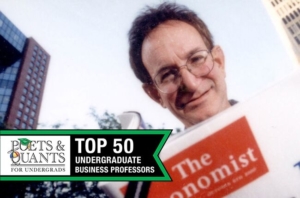Arnold Barnett
George Eastman Professor of Management Science and Professor of Statistics
Massachusetts Institute of Technology, Sloan School of Management
Arnold Barnett’s scholarly research on mathematical modeling related to health and safety has brought his academic work before U.S. presidents and media outlets ranging from The New York Times and Wall Street Journal to CNN Opinion and USA Today. What’s more, MIT Sloan students have honored him on 14 different occasions for outstanding teaching.
Barnett is the George Eastman Professor of Management Science and a Professor of Statistics at the Sloan School. His early work on homicide was presented to President Gerald Ford at the White House, and his analysis of U.S. casualties in Vietnam was the subject of a column by William F. Buckley. He received the President’s Award and the Expository Writing Award from INFORMS in 1996 and in 2001 and is a Fellow of INFORMS. Cited as “the nation’s leading expert on aviation safety,” Professor Barnett was recognized with the 2002 President’s Citation from the Flight Safety Foundation for “truly outstanding contributions on behalf of safety.”
Age: 70
Education: BA, Physics, Columbia; PhD, Mathematics, MIT
At current institution since: 1969
List of courses you currently teach: Introduction to Applied Probability; Applied Probability and Stochastic Models; Statistical Consulting
What professional achievement are you most proud of? Becoming a leading authority on aviation safety (The New York Times recently described me as “the dean of aviation safety statistics at MIT” meaning that I am the “dean” in that domain at MIT, not that MIT has a dean in such a specialized area!)
“I knew I wanted to be a business school professor when…” I taught MIT business students, who combine idealism, modesty, and immense analytic skill.
“One word that describes my first time teaching…” Exhilarating
What are you currently researching and what is the most significant discovery you’ve made from it? I research health, safety, and political science. My most striking recent discovery is that an American kid at a US airport is twice as likely to grow up to be President as to perish on the forthcoming flight.
What is your most memorable moment as a professor? When I learned that students had created a Facebook page (“I Heart Arnie Barnett”) and were posting quotes from my lectures.
Since you first started teaching, how has business education changed? The computer and the Internet have moved from near-nonexistence to the underpinning of the curriculum.
“If I weren’t a business school professor, I would be…” a math professor, but I wouldn’t enjoy it as much.
“Here’s what I wish someone would’ve told me about being a professor”: Go easy on humor and anecdotes; you’re there to convey challenging ideas and not to amuse yourself.
Name of the professor you most admire and why: Professor Polykarp Kusch (Physics, Columbia), who taught me the value of putting real-life problems at the center of the pedagogy.
What do you enjoy most about teaching undergraduate business students? Their talent, worldliness, and idealism
What’s the biggest challenge? Making sure that what I teach the students is what they most need to know
What is the most impressive thing one of your undergraduate students has done? Become one of the world’s leading bankers at Barclays
What is the least favorite thing one has done? Cheated in my class
Since you’ve been teaching, how have students changed over the years? At MIT, the students have not changed all that much: they are friendly, sophisticated, idealistic, and exceedingly bright.
What does a student need to do to get an A in your class? Show a strong level of mastery of the material. I do not grade on a curve, and would be happy to give all A’s (though that never has happened).
“When it comes to grading, I think students would describe me as …” Generous
If your teaching style/classroom experience had a theme song, what would it be? At the risk of seeming extremely pretentious, I’d say “My Way” by Frank Sinatra. My approach to teaching Probability/Statistics is not conventional, which is why I had to write two textbooks to present it.
Using just one word, describe your favorite type of student: Smart, intellectually curious, and hard-working
Using just one word, describe your least favorite type of student: Cynical and lazy
“If my students can apply Probability and Statistics to real problems with confidence, skill, and even enthusiasm, then I’ve done my job as their professor.”
Fun fact about yourself: I’m a strict vegetarian, which is far more difficult than it might seem and is more demanding than any popular religion.
What are your hobbies? I read voraciously, but do little else that could be called a hobby.
How did you spend your summer? Reading, teaching, and traveling to Ireland, Brazil, and Peru.
Favorite place to vacation: Los Angeles/New York
Favorite book: Any collection of essays by William F. Buckley
Favorite movie and/or television show: Homeland/Mr. Robot/Empire
Favorite type of music and/or favorite artist: Soft Rock, Billy Joel
Bucket list item #1: Visit every country in the world, even if briefly.
What’s the biggest challenge facing business education at the moment? Making sure that the growing prominence of Artificial Intelligence and immense computer power does not erode old-fashioned analytic skills.
“If I had my way, the business school of the future would have much more of this…” Emphasis on an ability to express complex thoughts in simple English.
“And much less of this…” Discussions in which emotion predominates over facts.
Looking ahead 10 years from now, describe what “success” would be like for you: I’m over 70. So my answer is: Staying alive.












Questions about this article? Email us or leave a comment below.